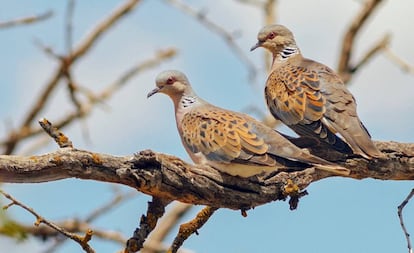Why Spain has become a nightmare for the endangered turtledove
Thirteen autonomous regions are ignoring Brussels and allowing this symbol of eternal love to be hunted, despite the country’s implication in the species’ dwindling numbers

Almost two million European turtledoves fly every year over the Iberian Peninsula on their migratory route to Sub-Saharan Africa, where they sit out the European winter after rearing their chicks. But recently, their flight across Spain has turned into a nightmare due to the total absence of measures protecting their numbers, as laid out by the European Commission in a case it recently opened against Spain.
The European Union (EU) authorities maintain that hunting is being allowed at unsustainable levels, causing the population to fall. To the indignation of ornithologists, the regional government of Galicia even allows them to be hunted in an area declared a Special Zone for the Protection of Birds (ZEPA).
The regional government of Galicia allows turtledoves to be hunted in an area declared a Special Zone for the Protection of Birds
But the reprimand from Brussels has done nothing to derail the turtledove hunting season, which happens around this time in 13 of Spain’s autonomous regions. Only the regional authorities in Asturias, Cantabria, Valencia and the Canary Islands, along with the Álava Provincial Council in Basque Country, have outlawed the hunting of this bird, whose population has declined by 40% in the last two decades and by almost 80% in Europe since 1980.
In the rest of the regions, where they have curtailed the length of the hunting season and reduced the quotas of the catch – a response Brussels considers insufficient given the scale of the problem – they will bring down another 500,000 to 800,000 birds in the next few weeks, according to the Spanish ornithologist Society, SEO Birdlife.
“The autonomous regions that have banned the hunting of the turtledove are areas where hunting is almost laughable [i.e. bordering on non-existent],” says Nicolás López-Jiménez from SEO Birdlife, which maintains that while the turtledove meets the criteria for conservation status the government is failing to act on account of pressure from the hunting lobby. “Where hunting is prominent, you can [shoot the turtledove]: Castilla y León, Extremadura, Andalusia, Aragón and Galicia. The fact that in the latter, a half season has been allowed in a ZEPA is incredible,” he says, adding that hunting the turtledove at this time of year is particularly delicate as some chicks have only just left the nest.
Spain is key to avoiding the extinction of the turtledove as it hosts more than half of the EU’s breeding population
The Agriculture Ministry has responded by pointing out that it cannot impose a moratorium on hunting as this is the remit of the regional authorities.
Spain is key to avoiding the extinction of the turtledove as it hosts more than half of the EU’s breeding population of between 2.4 million and 4.2 million.
This monogamous bird, which symbolizes eternal love, has become one of the many victims of the radical change in rural life. The Galician Society of Ornithologists points out that 30 years ago the bird was a frequent visitor to Galicia, where it fed mainly on the seeds of weeds on farming land and, according to a spokesman for the organization, the abandonment of estates and the systematic use of herbicides is seriously affecting their food supply.
Ecologists in Action have reported the Galician government to the public prosecutor for allowing the turtledove to be hunted in the protected A Limia area of Ourense, despite the fact that Brussels has singled Galicia out, along with the Basque Country, for its predominant role in the decline of the species.
The Environment Council of Galicia argues, however, that the number of turtledoves shot during the half season – which will last until September 8 – is very small, adding that a study of the species carried out in A Limia since 2017 shows the breeding population to have maintained levels, suggesting stability.
The central Spanish government has tried to convince Brussels that a moratorium on hunting the turtledove is not necessarily the right way to go
The central Spanish government has tried to convince Brussels that a moratorium on hunting the turtledove is not necessarily the right way to go, as in Asturias and the Canaries such a measure has failed to have a positive impact on numbers.
But the EU authorities have shot back, noting the lack of reliable data in the report presented in defense of this position. “The study shows a serious lack of information and indicates the probability that the numbers of turtledoves killed has been underestimated,” according to an EU statement.
The Commission maintains that Spain has violated Article 7 of the EU Birds Directive, having authorized the shooting of the turtledove at unsustainable levels and without adequate analysis and data due to pressure from the hunting lobby.
Both Brussels and ecologists are, however, clear that excessive hunting is not the only threat to the turtledove population. Spain is also accused of violating Article 3 of the Birds Directive, which addresses the issue of preserving the bird’s habitat, such as oilseed and vegetable plantations, wastelands and meadows and also riverbank woodland. Spain is also accused of infringing Article 4, which concerns designating appropriate conservation areas, taking into account breeding and the need for rest as the birds embark on their long-haul 4,000-kilometer flight to Africa.
Hunters who nurture their prey
The regional government of Extremadura is demanding that the Spanish state tackles the hunting of the turtledove and the other issues jeopardizing its survival in equal measure.
The Extremaduran authorities maintain that the species’ dwindling numbers have more to do with the poverty of the environment and the loss of habitat engendered by intensive farming than hunting, and mention a number of other birds, including the bustard and hen harrier, who are suffering a similar fate.
The Extremadura regional government agrees with the hunting lobby that to ban the shooting of the turtledove during the season could even threaten its conservation as the owners of hunting land lay out seeds and water feeders to ensure its presence, which they obviously would not do should hunting be banned. “There are hunting areas where there are still plenty of birds because they are looked after and hunted sustainably,” says a spokesman for the Artemisan Foundation, which is comprised of hunters, private land owners and companies.
English version by Heather Galloway.
Tu suscripción se está usando en otro dispositivo
¿Quieres añadir otro usuario a tu suscripción?
Si continúas leyendo en este dispositivo, no se podrá leer en el otro.
FlechaTu suscripción se está usando en otro dispositivo y solo puedes acceder a EL PAÍS desde un dispositivo a la vez.
Si quieres compartir tu cuenta, cambia tu suscripción a la modalidad Premium, así podrás añadir otro usuario. Cada uno accederá con su propia cuenta de email, lo que os permitirá personalizar vuestra experiencia en EL PAÍS.
¿Tienes una suscripción de empresa? Accede aquí para contratar más cuentas.
En el caso de no saber quién está usando tu cuenta, te recomendamos cambiar tu contraseña aquí.
Si decides continuar compartiendo tu cuenta, este mensaje se mostrará en tu dispositivo y en el de la otra persona que está usando tu cuenta de forma indefinida, afectando a tu experiencia de lectura. Puedes consultar aquí los términos y condiciones de la suscripción digital.









































